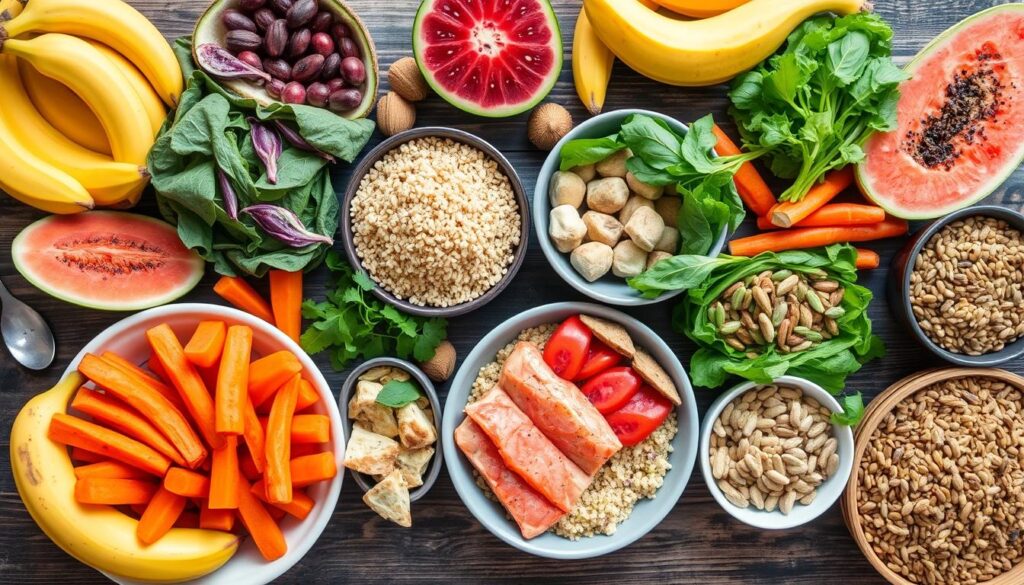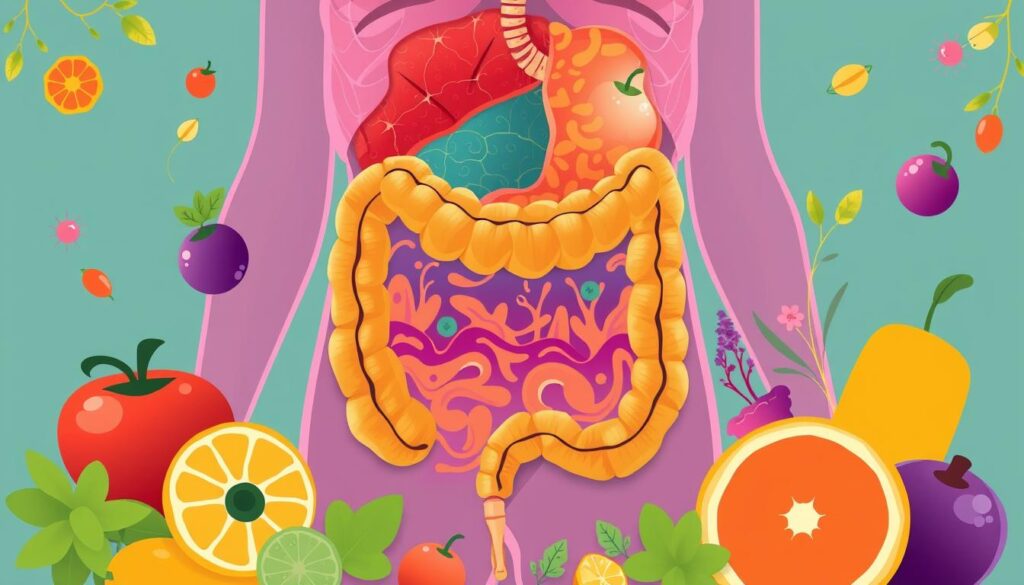Did you know the average person passes gas up to 20 times a day? Flatulence, or the release of intestinal gas, is a natural bodily function. It affects everyone. But, too much gas can cause discomfort, embarrassment, and health worries. This article looks into why we get gas, the science behind it, and natural ways to ease gas and bloating.

Key Takeaways
- Flatulence is a normal and natural bodily function, but excessive gas can be a sign of an underlying digestive issue.
- The production of intestinal gas is a complex process involving the breakdown of food, the growth of gut bacteria, and the release of gases through the digestive system.
- Common causes of excessive gas include diet, food intolerances, gut health imbalances, and certain medical conditions.
- Natural remedies such as herbal supplements, lifestyle changes, and probiotics can help manage and reduce excessive gas and bloating.
- Seeking medical attention is recommended if gas-related symptoms persist or worsen, as it may be a sign of a more serious digestive disorder.
What Is Flatulence and Why Does It Occur?
Flatulence, or farting and belching, is a natural body function. It’s when gas from our digestive system is released. This gas is mostly odorless, made up of carbon dioxide, hydrogen, and methane. But sometimes, sulfur compounds can make it smell.
The Science Behind Intestinal Gas Formation
Intestinal gas is a byproduct of digestion. It happens when our gut bacteria break down food. This gas builds up in our digestive system and must come out through belching or farting.
The amount and smell of this gas change based on our diet, gut bacteria, and health.
Normal vs. Excessive Gas Production
It’s normal to pass gas a few times a day. Most people fart between 12 to 25 times daily, with gas volumes ranging from 500 to 1,500 milliliters. But too much gas can cause discomfort and embarrassment.
Excessive gas might mean there’s a problem with digestion or food intolerance.
| Normal Gas Production | Excessive Gas Production |
|---|---|
| 12 to 25 times per day | More than 25 times per day |
| 500 to 1,500 milliliters | More than 1,500 milliliters |
| Minimal discomfort | Significant discomfort, bloating, and embarrassment |
Knowing when gas production is normal or too much helps us spot digestive problems. It guides us to find ways to manage farting, belching, and gas relief.
Common Causes of Excessive Gas and Bloating
Digestive problems and poor gut health can lead to too much gas and bloating. This can make you feel uncomfortable and disrupt your daily activities. Knowing what causes this issue is the first step to finding relief.
Eating high-FODMAP foods is a big contributor to gas. These carbs are hard for some people to digest, causing gas in the intestines. Foods like beans, lentils, onions, and dairy products are common culprits.
Food intolerances, like lactose intolerance or gluten sensitivity, can also cause gas. When the body can’t digest certain foods, they ferment in the gut. This fermentation leads to gas release.
| Potential Causes of Excessive Gas | Symptoms |
|---|---|
| High-FODMAP foods | Bloating, abdominal discomfort, flatulence |
| Food intolerances | Bloating, gas, diarrhea, constipation |
| Digestive disorders | Excessive gas, abdominal pain, changes in bowel habits |
| Lifestyle factors | Bloating, gas, discomfort after meals |
Digestive disorders like irritable bowel syndrome (IBS) or small intestinal bacterial overgrowth (SIBO) can also cause gas. These conditions upset the balance of gut bacteria, leading to more gas.
Lifestyle choices, such as stress, not moving enough, and eating too fast, can worsen digestive problems and gas. By tackling these causes, you can ease the discomfort of too much gas and bloating.
How Diet Affects Your Gas Production
The foods we eat greatly affect how much gas we produce. Knowing how diet and flatulence are connected is crucial for managing this common issue.
High-FODMAP Foods and Flatulence
FODMAP stands for Fermentable Oligosaccharides, Disaccharides, Monosaccharides, and Polyols. These carbs are hard for some to digest, causing more gas. Foods like beans, broccoli, and dairy can make gas worse for those with sensitive stomachs.
Food Intolerances and Gas Formation
Some food intolerances, like lactose or gluten sensitivity, also lead to more gas. When the body can’t digest certain foods, they ferment in the gut. This causes gas and discomfort.
The Role of Fiber in Digestive Health
- Dietary fiber is key for a healthy gut and managing gas.
- Soluble fiber in oats and apples helps absorb gas and keeps bowel movements regular.
- Insoluble fiber in whole grains and veggies adds bulk, helping waste move through the intestines.
- But, increase your fiber slowly to avoid gas and bloating during the adjustment.
By understanding how diet affects gas and making smart food choices, you can reduce flatulence. This promotes better digestive health overall.
Understanding the Link Between Gut Health and Flatulence
Gut health is key to understanding flatulence. The balance of gut microbes affects gas production and digestion. This balance is vital for our digestive health.
When the gut microbiome is out of balance, it can cause too much gas. This imbalance can come from bad diet, antibiotics, stress, and some health issues. The wrong mix of gut bacteria can lead to more gas, causing discomfort and embarrassing gas.
Keeping a healthy gut health is important. A balanced diet, exercise, and probiotics can help. Probiotics are good bacteria and yeast that aid digestion, reduce inflammation, and improve gut balance.
“A healthy gut is the foundation for overall well-being, and addressing gut health can be a powerful step in managing flatulence and other digestive issues.”
Knowing how gut health and flatulence are connected helps us take action. We can improve our digestion and manage gas better.

Natural Remedies for Gas Relief
If you’re dealing with ongoing gas and digestive problems, there are natural solutions to help. You can try herbal remedies or make lifestyle changes. These methods can ease excessive gas and improve digestion.
Herbal Solutions for Digestive Comfort
For centuries, herbs have been used to ease stomach pain, including gas. Here are some herbs that can help with gas relief:
- Peppermint: It relaxes the digestive tract muscles, reducing gas and bloating.
- Fennel: This herb stimulates digestive enzymes, helping break down gas-producing foods.
- Ginger: It has anti-inflammatory and gas-expelling properties, easing digestive issues and promoting digestion.
Lifestyle Changes That Help Reduce Gas
Making some lifestyle changes can also help manage gas:
- Eat slowly and chew well to aid digestion.
- Stay away from carbonated drinks and foods that cause gas.
- Eat a diet full of fiber to support gut health.
- Drink lots of water all day to stay hydrated.
Exercise and Physical Activity Benefits
Regular exercise can help with gas relief by boosting digestion and gas release. Yoga, walking, and light stretching can ease bloating and discomfort.
“Incorporating natural remedies and lifestyle changes can be an effective way to manage excessive gas and promote overall digestive well-being.”
The Role of Probiotics in Managing Intestinal Gas
Keeping our gut healthy is key to handling digestive problems like too much gas. Probiotics, the good bacteria in our intestines, are a big help. They support our gut health and help cut down on gas.
Probiotics help balance the good bacteria in our gut. When this balance is off, bad bacteria can grow too much. This can cause more gas and other digestive issues. Taking probiotics can help fix this balance and ease gas problems.
Research shows that some probiotics, like Bifidobacterium and Lactobacillus, are great at reducing gas. They help break down hard-to-digest carbs and control gas production.
- Probiotics can help break down complex carbohydrates that contribute to gas formation.
- Certain probiotic strains, like Bifidobacterium and Lactobacillus, have been found to be effective in reducing flatulence.
- Maintaining a healthy gut microbiome by incorporating probiotics can promote better digestion and alleviate excessive gas.
Adding probiotic-rich foods or supplements to our diet can help manage gas. Foods like fermented dairy and veggies, or supplements, can use probiotics to fight gas. This natural approach can greatly improve our gut health and reduce gas discomfort.
“Probiotics are a powerful tool in the management of digestive issues, including excessive gas production. By restoring the balance of beneficial bacteria in the gut, they can help alleviate the discomfort and embarrassment associated with flatulence.”
When to Seek Medical Attention for Excessive Gas
While passing gas is normal, too much can signal a problem. If you’re dealing with digestive issues or bloating that bothers you a lot, see a doctor.
Warning Signs and Symptoms
Here are some signs you might need to see a doctor:
- Severe, ongoing belly pain or discomfort
- Too much burping or belching that gets in the way of your day
- Unintentional weight loss or trouble keeping a healthy weight
- Recurring or frequent diarrhea, constipation, or bowel habit changes
- Blood in your stool or unexplained rectal bleeding
Related Digestive Conditions
Too much gas can point to several digestive problems, including:
- Irritable Bowel Syndrome (IBS): A long-term gut issue with pain, bloating, and bowel changes.
- Lactose Intolerance: Trouble digesting lactose in milk and dairy, causing gas and discomfort.
- Small Intestinal Bacterial Overgrowth (SIBO): Too many bacteria in the small intestine, leading to gas.
- Celiac Disease: An autoimmune reaction to gluten, causing gas, bloating, and other digestive problems.
If you’re dealing with ongoing digestive issues or bloating, talk to a doctor. They can find out why and help you feel better.
Preventing Gas Through Mindful Eating Habits
Keeping your digestive system healthy is key. One good way to avoid too much dietary fiber and food intolerances is to eat mindfully. This helps cut down on the gas you might feel.
Chewing your food well is a big help. It makes digestion easier and breaks down tough carbs and fibers. This stops them from fermenting in your gut and causing gas. Eating slowly lets your body soak up nutrients better and tells your brain you’re full, so you don’t overeat.
Knowing what foods make you feel gassy is also important. Some foods like legumes, cruciferous veggies, or dairy can make gas worse. Writing down what you eat can help you spot these foods and choose better ones.
Regular exercise is also good for gas management. It gets your digestive system moving, helping get rid of gas and waste. Drinking plenty of water and avoiding fizzy drinks also helps keep your gut healthy and gas down.

“Paying attention to how we eat can have a significant impact on our digestive health and overall well-being.”
By eating mindfully, you can prevent the discomfort and embarrassment of too much gas. Remember, everyone’s body is different. So, try different things to find what works best for you.
Debunking Common Myths About Flatulence
Flatulence, or farting, is a natural bodily function that often carries a social stigma. However, many misconceptions surround this ubiquitous phenomenon. Let’s debunk some of the most common myths about flatulence and belching.
Myth 1: Farting and Belching Are Rude Behaviors
Farting and burping are normal physiological processes that everyone experiences. Treating them as taboo or shameful is often an outdated cultural norm.
Myth 2: Excessive Farting Is a Sign of Poor Health
Passing gas 10 to 20 times per day is considered normal. The frequency can vary depending on individual factors, such as diet and gut health. Only when gas becomes excessive or accompanied by other symptoms should it be a cause for concern.
Myth 3: Farting During Yoga or Meditation Is Embarrassing
Passing gas during physical activity is a common occurrence and not a reflection of one’s abilities or spiritual practice. It’s simply the body’s way of releasing built-up intestinal air.
Myth 4: Holding in Farts Is Healthier
Trying to suppress flatulence can lead to discomfort and even pain. It’s better to let gas pass naturally rather than holding it in, which can cause bloating and potential health issues.
| Myth | Truth |
|---|---|
| Farting and belching are rude behaviors. | They are normal physiological processes. |
| Excessive farting is a sign of poor health. | Passing gas 10-20 times per day is considered normal. |
| Farting during yoga or meditation is embarrassing. | It’s a common occurrence and not a reflection of one’s abilities. |
| Holding in farts is healthier. | Letting gas pass naturally is better than suppressing it. |
By understanding the facts and dispelling these common myths, we can normalize the natural process of farting and belching, and focus on maintaining a healthy digestive system.
Conclusion
In this article, we’ve looked into the details of flatulence, its causes, and natural ways to handle it. We’ve covered how gas forms in the intestines and what foods and habits can lead to more gas. This guide aims to help you improve your gut health and feel better.
By trying out certain tips, like eating probiotic foods, adjusting your fiber, and exercising, you can reduce flatulence discomfort. A balanced diet, drinking enough water, and listening to your body are also important. These steps can help you feel more comfortable and relieved.
Keep learning about flatulence and how to manage it. Remember, everyone’s body is different, so what works for one might not work for another. Be open, patient, and talk to doctors if you’re worried. With the right steps, you can make your gut happy and enjoy better digestion.
FAQ
Q: What is flatulence and why does it occur?
A: Flatulence, or passing gas, is when gas from the digestive system is released. It happens when gas builds up and is let out through the rectum. This gas comes from the breakdown of food by bacteria in the gut.
Q: What are the common causes of excessive gas and bloating?
A: Many things can cause too much gas and bloating. This includes eating certain foods, having food intolerances, and digestive issues. Some medical problems, like irritable bowel syndrome (IBS), can also cause more gas.
Q: How does diet affect gas production?
A: What you eat greatly affects how much gas you make. Foods high in fermentable carbs can make more gas. Food intolerances, like lactose or gluten, can also cause gas. But, eating foods high in fiber helps keep digestion healthy and can reduce gas.
Q: What is the link between gut health and flatulence?
A: Gut health and flatulence are very connected. An imbalance in gut bacteria can lead to more gas. Using probiotics and other gut-friendly foods can help manage gas and improve digestion.
Q: What are some natural remedies for gas relief?
A: There are many natural ways to ease gas. Herbal teas like peppermint, ginger, or fennel can soothe your stomach. Regular exercise and mindful eating can also help. Some supplements, like probiotics, can also help manage gas.
Q: When should I seek medical attention for excessive gas?
A: If you have a lot of gas that doesn’t go away, or if it’s really bad, see a doctor. It could mean you have a digestive problem that needs treatment.
Q: How can I prevent gas through mindful eating habits?
A: To avoid gas, eat slowly and chew well. Know which foods make you gassy. Eating foods high in fiber and staying hydrated also helps keep gas levels down.
Q: What are some common myths about flatulence?
A: Some myths say passing gas means you’re sick, that holding it in is bad, or that beans are the only cause of gas. But, passing gas is normal. Finding out why you have too much gas is important for managing it.
